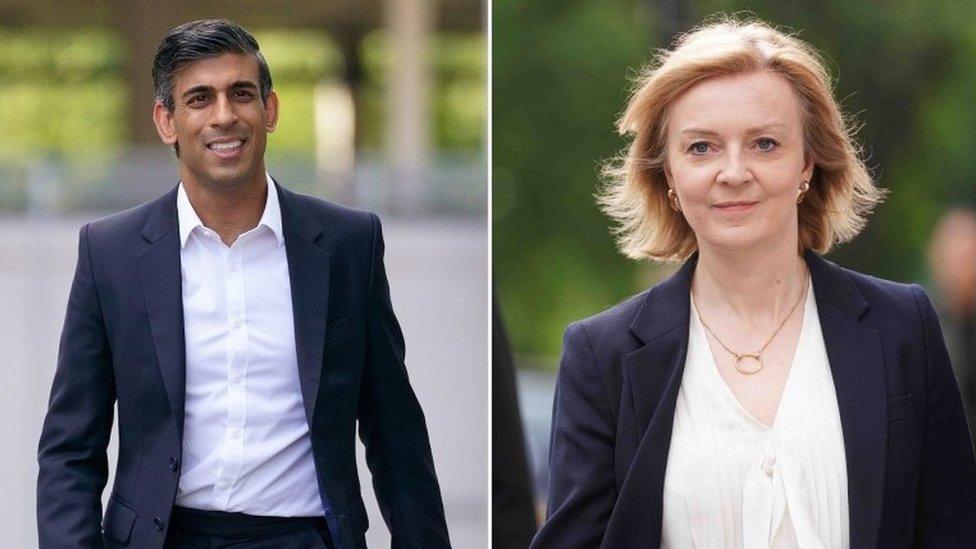What can be done to tackle the energy crisis?
- Published

Whoever becomes prime minister will be faced with difficult decisions from day one
A sense of scale is important when considering the size of the energy crisis now facing every household in the country - and what the government will have to do about it.
Average energy bills of nearly £300 per month are unthinkable and unmanageable for several million households.
Friday's energy price cap announcement from Ofgem puts them at this level from October onwards.
But some predictions have that number at £550 per month by April - closer to the average cost of a mortgage - as wholesale gas prices have surged yet higher in recent days.
For an average household on £31,000 income per year, energy costs are set to exceed income tax bills. Or alternatively, the energy rise we will have seen since last year, is the equivalent of adding 15p to 20p to the basic rate of tax.
It will drain the disposable income of several million households.
And it is not just an issue which will transform the path of the economy. These rises are so large and so widespread that they could test the nation's social resilience too.
Even the energy industry itself doesn't think these rises are possible.
At a recent meeting with the government to discuss the Energy Tariff Deficit Fund, a key takeaway was that not one energy firm believed that it is feasible to charge the nation what the companies themselves are having to pay to purchase gas.
That is an amazing and remarkable situation.
So that gaping hole, that is getting larger every day, week and month is now in the hands of the government.
Ultimately, the government must choose who needs help. It will be over half of households at least.
Extending it to everyone will cost much more, but will also rein in the overall inflation rate, and be far simpler. There is a vein of thinking that wealthier households that accumulated savings during the pandemic should pay their own way.
It comes down to a choice between tens of billions of pounds and several tens of billions.
And so far, we are getting very little of the relevant detail from the Conservative leadership, and future Prime Minister, candidates Liz Truss and Rishi Sunak.
Then there is also the question of who should pay eventually. Government borrowing will go up at first. But the energy industry has suggested that customers essentially repay this back with higher bills for the next decade through the Energy Tariff Deficit Fund.
The net result would be to keep bills from rising much above £2,000 on average, but there would have to be acceptance that they would come down only very slowly into the 2030s, even if the war in Ukraine is over.
This may not work. So those parts of the energy industry making even greater profits from exactly the same gas extraction might face a further tax grab. Or general taxes might have to increase. This would require a breaking of some of the promises in the Conservative leadership campaign even before it is over.
Extra borrowing could take the strain.
But market interest rates are already surging and high inflation is also fast increasing the price of government borrowing. The Bank of England also faces even higher inflation and even higher government borrowing.
It is a potent mix: inflation, recession, high debts, and the core reason for it all, a wartime energy shock
And perhaps that is the point. It is not the market driving this. It is geopolitics, diplomacy and conflict.
Margaret Thatcher's former energy secretary Lord David Howell, told the BBC this week the country needed to be on "a war-footing" as regards energy and that these bills were simply "impossible".
At the very moment that most households come to see that the "energy price cap" is not really a cap on the price they pay for energy, it seems likely that the government may have to encourage immediate measures to save energy.
The new Prime Minister will have to make an ominous judgement even before they get the keys to Downing Street.
